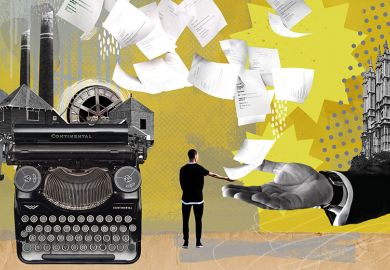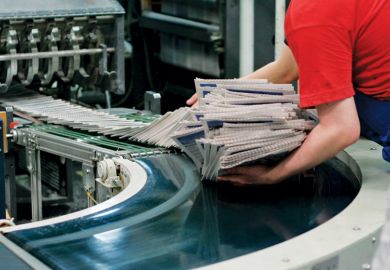Universities must not cut back on efforts to catch students who use essay mills once new software to identify ghostwritten papers is released later this year, experts have said.
Earlier this month, the anti-plagiarism software company Turnitin unveiled its first electronic tool to help catch students submitting work written by other people.
The product, known as Authorship Investigation, is expected to be ready by the second half of 2018 and is the first major product designed to thwart the multimillion-pound industry of internet-ordered student essays. It will use machine-learning algorithms and forensic linguistic analysis to detect major differences in students’ writing style between papers.
The Quality Assurance Agency estimates that every year about 17,000 students are caught using essay mills in the UK alone, but the actual numbers using these sites worldwide are much higher.
Phil Newton, director of learning and teaching at Swansea University’s medical school, who researches academic integrity issues, said that while Turnitin’s announcement was a “welcome development”, the software would not be enough to stop contract cheating.
“Addressing contract cheating requires a holistic approach, and there is not going to be a single solution,” said Professor Newton, who is an unpaid member of Turnitin’s academic integrity taskforce.
“We need to improve the design of our assessments, the education and support for students and staff and we need improvements in the law and regulation surrounding higher education.”
While the new software would assist markers who had concerns, it should be “just one part of the evidence basis for an academic judgement about originality of a piece of work”, added Professor Newton.
“I am sure many will feel uncomfortable about making high-stakes decisions on the basis of AI,” he said, adding that he hoped the threshold for triggering a concern would be high to “avoid the damaging effect of a ‘false positive’ accusation where a student has simply developed or changed their writing style”.
“There are often differences in writing style between and within pieces of work by the same student, but the really striking differences can be an indication that something is not quite right,” he said.
Another anti-cheating expert, Thomas Lancaster, who is associate dean for student recruitment at Staffordshire University, also expressed caution about relying on the tool too heavily.
While its introduction would be “timely and welcome”, Dr Lancaster said that universities “must remember that technology like this can’t detect contract cheating”.
“All it can do is flag up assessments for further investigation, so staff will need training, and universities will have to make sure their academic integrity processes are in order to allow reports from this software as evidence,” he said.
Universities also need to be “ready for essay mills addressing this technology”, he added.
“They could, for instance, offer students a premium cheating service where they get allowed the same writer for every essay,” said Dr Lancaster.
“We therefore have to continue to consider the types of assessments we set students and not rely on any new technology as a single solution.”
Register to continue
Why register?
- Registration is free and only takes a moment
- Once registered, you can read 3 articles a month
- Sign up for our newsletter
Subscribe
Or subscribe for unlimited access to:
- Unlimited access to news, views, insights & reviews
- Digital editions
- Digital access to THE’s university and college rankings analysis
Already registered or a current subscriber?








